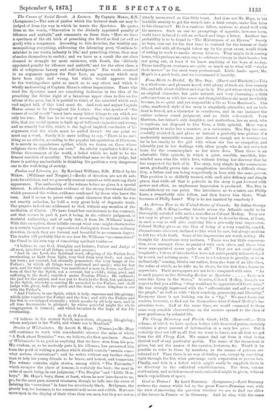From Birth to Bridal. By Mrs. Day. (Hurst and Blackett.)—This
is a wholesome and pleasant novel, with plenty of fresh air, free country life, and talk about children and dogs in it. The girl whose story it tolls is an original character, but quite natural, and very charming; a little self-conscious, as with her sense and thoughtfulness she must inevitably become, in so quiet and yet responsible a life as Vera Harrison's. 'rho calm, unaffected style of the story is singularly attractive, not an inci- dent is forced, not a character is overdrawn, and in one instance tho author evinces sound judgment, and no little self-control. Vera Harrison, her father's only daughter, and motherless, has an aunt, who is captious, not disposed to like Vera, a little spitefuL Hero was a temptation to make her a monster, or a caricature. Mrs. Day has suc- cessfully resisted it, and gives us instead a perfectly true picture of a moderately unamiable woman, just shrewd enough not to venture too far in her enmity to the girl with whom she has no sympathy, and tolerably just in her dealings with other people who do not cross her taste for the common-place as her niece does. Then there is an admirable little episode, in which a quiet, sensible, unselfish, fair- minded man wins his wife's loco, without letting her discover that ho has suspected the lack of it. The story, very simple in the commence- ment, gradually grows into a complication involving a difficult situa- tion, a father and son being respectively in love with the same person. This position is so skilfully treated, with such nice delicacy and simple grace, that while all that is pathetic in the story is put forward with power and effect, no unpleasant impression is produced. Mrs. Day is unsatisfactory on one point. She introduces us to a tutor, one Philip Lane, a remarkably nice fellow, and then leaves him there. What becomes of Philip Lane? Why is ho not married by somebody ?






























 Previous page
Previous page